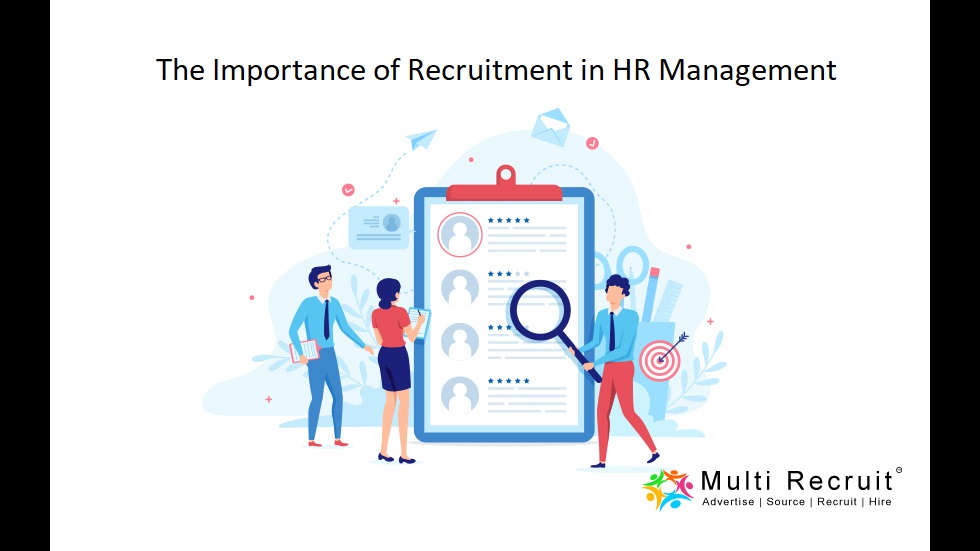The financial figures of an organization are often used as a measure of a company’s success. The focus is often directed away from the aspect of a company’s success that reflects its success, its employees. As a result, they are unaware of the importance of recruitment.
Your attitude and viewpoint towards recruitment will determine your business’s success. Employees work hard to achieve organizational goals. The right mix of talent is essential for companies that want to grow rapidly but steadily, so recruitment is crucial.
What is Recruiting?
Employee recruitment is the process of identifying, interviewing, and hiring new employees. There will be more opportunities to hire the right candidate when more people apply for a position. Diversity in recruitment is also important for this reason.
The job seeker, on the other hand, searches for organizations that may employ him or her. Employers and job seekers are connected by recruitment, which is a linking activity. Recruiting is the process of finding and selecting potential employees from a variety of sources. The benefits of a scientific recruitment process include higher productivity, better pay, better morale, lower turnover, and a better reputation. The program encourages people to apply for jobs, which is a good thing.
Recruitment: Its Purpose and Importance
There is quite a bit of detail involved in the recruitment process. Effective recruitment processes are vital to acquiring new talent and maintaining business continuity.

1. Helps Analyze current & future requirements
An organization’s recruitment process helps it assess its current and future staffing needs. To determine how many recruits are needed, it conducts a methodical examination of company operations.

2. Prevents disruption of business activities
As a result of the recruitment process, the daily activities of your organization will run smoothly. The organization provides businesses with all the human resources they need for a variety of job positions on a regular basis. To meet the needs of the organization, recruitment processes select candidates from a variety of backgrounds.

3. Increases the success rate of hiring
In this way, the company’s selecting process can be stimulated to increase its success rate. All job applications are analyzed to reduce the frequency of unqualified and exaggerated applicants. The recruitment process advances only qualified applicants to the next stage.

4. Access to wider Talent pool
In recruitment, the objective is to create a large pool of qualified candidates from which the most qualified candidate can be chosen. In this way, big groups of individuals are attracted to a company and encouraged to apply for open positions.

5. A cost-effective solution
Ensures that total costs and time spent on employee recruitment are minimized. An organized and systematic recruitment process involves giving a detailed description of a job opening to a large number of people. When a job description is good, a large number of people can be recruited at a low cost.

6. Enhances the credibility of the organization
Recruiting effectively enhances the reputation of a business organization. In addition to assessing job openings’ validity, it reflects the company’s professionalism and authenticity. In order to increase the trust of job applicants, a company organization must adopt a good application method. Your company will then be able to attract highly qualified candidates.
How does human resource management benefit from recruitment?
Recruiting employees is extremely important in human resources management because it ensures that employees who wish to join the company are a perfect fit, as well as demonstrating the professionalism of the entire organization from the very beginning when a prospective employee wishes to join the organization. In addition, recruitment is important for gaining skilled employees, ensuring a cultural fit, saving time and money, and improving employee satisfaction.

• Hire skilled employees
It is the responsibility of HR managers to ensure that skilled employees are recruited throughout the recruitment process. As a result, businesses will acquire employees with skills perfectly suited to their current needs. Additionally, by recruiting new employees, organizations can acquire skills that do not exist within the company.
For human resource management to thrive, recruitment is critical, as it allows them to find talent that will be extremely beneficial to the entire organization.
Through effective recruitment processes, HR departments can achieve high productivity levels to achieve desired outcomes and work effectively towards goals by acquiring skills necessary to fill roles in teams.

• Ensures cultural fit
By ensuring that employees are culturally compatible with the organization throughout the recruitment process, managers are able to hire the right employees. The HR professional can ensure and test whether employees will fit into the organization’s culture throughout the recruitment and selection process. If HR deems it necessary, they might not hire an employee used to a culture based on reliance upon oneself if the company culture is based on teamwork and employees working together.
Consequently, HR managers must know their recruitment objective and strive to hire employees who will effectively fit into the organization’s culture. In the same way, many HR professionals have thought about describing the organization’s culture within the job description, so that prospective employees can determine if their culture fits with the organization’s.

• Time and money are saved
HR Managers can effectively save time and money for their organizations through the recruitment process. In this case, HR managers will ensure that they are hiring the right employee who is best suited to meet the organization’s objectives throughout the hiring process so that if an employee does not meet expectations, they will not have to waste both time and money looking for another employee.
This will be accomplished by selecting an employee who has, if not all, at least most, of the skills expected for the job. HR managers can also reduce the cost of training employees this way, because employees who already possess certain skills do not need extensive paid training. HR managers will also save time and money by not having to train employees repeatedly if one does not fit the job.

• Enhances employee satisfaction
Employee satisfaction can be significantly improved by improving the recruitment process. HR managers must ensure that the entire recruitment process is as easy and interesting for the prospective employee as possible so that future onboarding employees are delighted with the organization. By offering an outstanding recruitment process, HR managers can fulfill the employee value proposition (EVP) fully.
Moreover, highly skilled employees can significantly increase the satisfaction of other employees when they join and are extremely helpful to teams and other individuals.
Additionally, when employees undergo a unique recruitment process that ensures to motivate employees when they enter the organization because of potential development opportunities, a major increase in employee satisfaction can be seen when employees receive what they expect.

• Maintains a positive image of the brand
Last but not least, HR managers should pay attention to recruitment so that they can maintain and create a positive brand image. The recruitment process influences employees who are learning about the company and have a positive perception of it through meetings they have in interviews.
Positive interviews conducted by HR managers will not negatively impact the business’s brand image. It creates a sense that an organization is a great place to work when the recruitment process is positive. Maintaining a positive recruitment process is essential to creating a positive brand perception for HR professionals.
Conclusion
Recruiting involves finding and hiring candidates to fill open positions: that’s what it’s all about. On the other hand, effective recruiting is a combination of art and science. The process requires the implementation of repeatable procedures that produce consistent results. Additionally, thinking outside the box to find your perfect candidate will benefit your organization in the long run since it will streamline the onboarding process. We must acknowledge the importance of personal skills in recruitment despite recruitment being a critical and formal process.
Many companies automate a majority of the recruitment process. It is, therefore, beneficial to implement an ATS (Application Tracking System) that catalyzes the process and delivers flawless results.
There are many benefits to Recruiting, including
Improve your ability to attract and engage customers
Hire the best candidates
Software that adapts to business needs
Success is measured by
Ensure you are targeting and selecting the right candidates with total visibility into the metrics.
To know more contact Multi Recruit, the top recruitment & HR consultancy in Bangalore, India provides end-to-end recruitment solutions across all industry sectors and fields.

